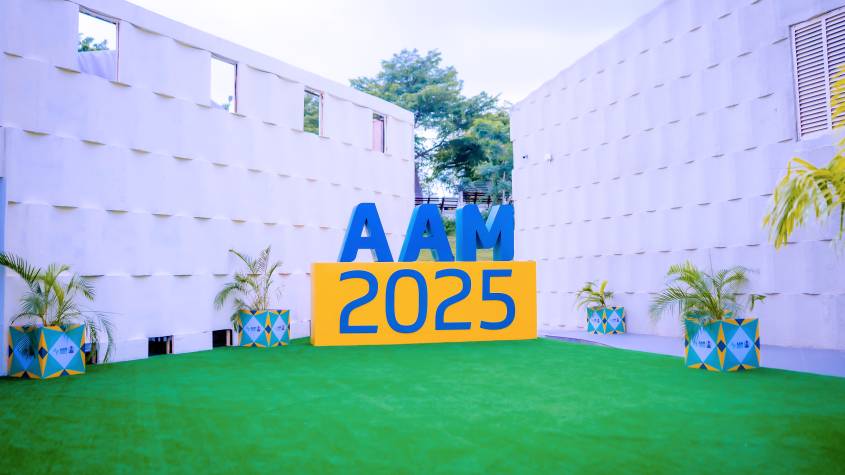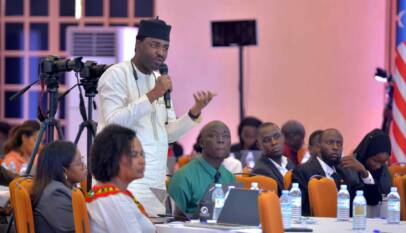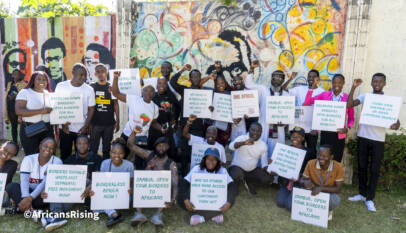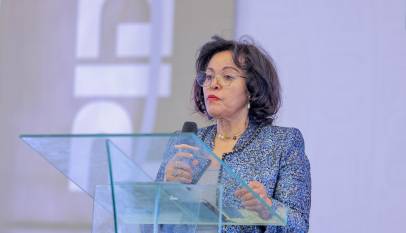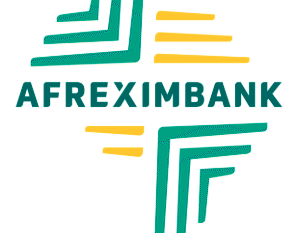Afreximbank: From Three Decades of Resilient Impact to a Future of Promise
The 32nd Annual Meetings of the African Export-Import Bank (Afreximbank), held June 25 – 28, 2025, in Abuja, Nigeria, marked a historic milestone which convened African and Caribbean heads of state, finance ministers, central bank governors and private sector leaders who reflected on Africa and its Diaspora’s development trajectory.
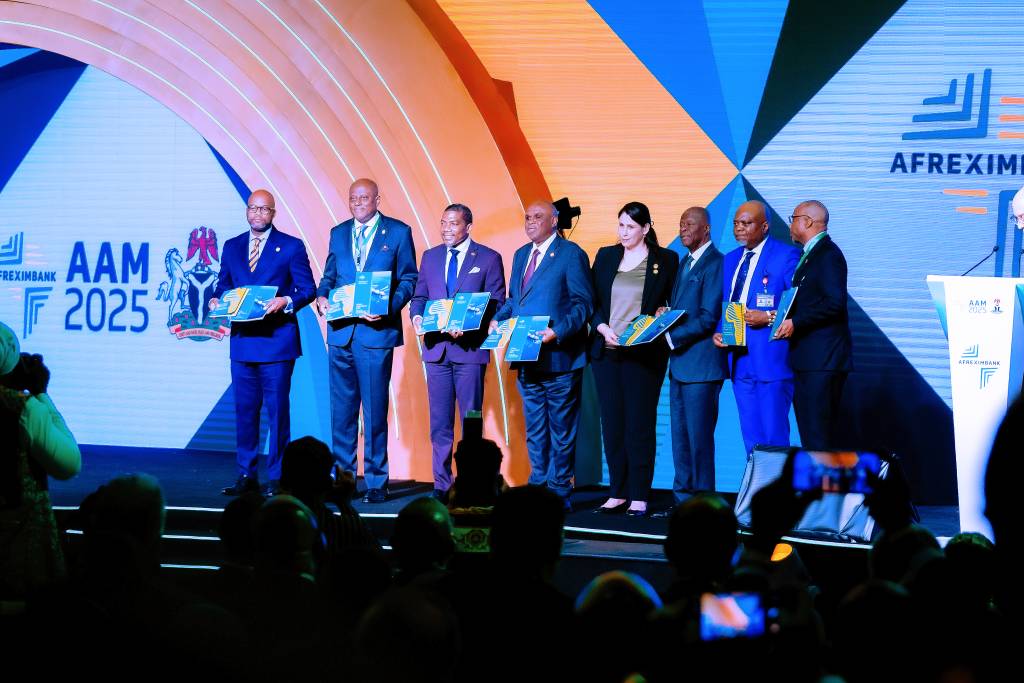
The African Export-Import Bank (Afreximbank), a Pan-African multilateral financial institution dedicated to financing and promoting intra- and extra-African trade, held its 32nd Annual Meetings (AAM2025) at a pivotal moment of leadership transition. Held under the theme “Building the Future on Decades of Resilience,” AAM2025 convened African and Caribbean heads of state, finance ministers, central bank governors, private sector leaders, and development partners to reflect on Africa and its Diaspora’s development trajectory.
The event was a platform for reflection on more than three decades of the Bank’s impact in driving Africa’s trade integration, economic development, and resilience, underscoring its central role in shaping the continent’s trade and financial architecture. The convening focused on repositioning Africa in the context of a shifting global economic environment, while charting a forward-looking agenda anchored in trade, innovation, and financial sovereignty. The meeting also spotlighted Afreximbank’s transformation from a fledgling institution into one of Africa’s most influential multilateral development banks.
Over the past three decades, it has mobilized more than $250 billion in support of African economies, playing a pivotal role in crisis response—most notably serving as a financial lifeline during the COVID-19 pandemic. Founded in 1993 to address Africa’s limited access to global capital, Afreximbank was created to promote and finance intra- and extra-African trade. Its establishment was formalized in Abidjan through the signing of its Charter and Agreement by participating states. Later that year, the Bank held its inaugural General Meeting of Shareholders in Abuja, where Mr. Christopher Edordu was appointed as its founding President.
Since beginning operations in 1994, Afreximbank has played a central role in advancing Africa’s economic integration, commencing with its participation in a $150 million syndicated loan to Ghana’s Cocoa Board. Over the years, the Bank has mobilised over $250 billion to support African economies, providing critical financing during crises and investing in infrastructure, trade facilitation, and industrialisation.
Today, Afreximbank is recognized as one of Africa’s most influential multilateral financial institutions, with total assets surpassing $40 billion and a robust portfolio that includes flagship initiatives like the Pan-African Payment and Settlement System (PAPSS) and the $10 billion AfCFTA Adjustment Fund. Through these efforts, the Bank continues to champion trade-led development, empowering African nations to shape and secure their economic future.
AAM2025 served not only as a platform to celebrate the Bank’s three-decade legacy and chart forward-looking strategies for Africa’s economic transformation amid rising protectionism and deglobalisation, but also as a valedictory event for outgoing President Prof. Benedict Okey Oramah, whose decade-long leadership significantly elevated the Bank’s impact, scale, and relevance across the continent.
Under Prof. Oramah’s leadership (2015 to 2025), Afreximbank experienced unprecedented growth, with total assets and guarantees rising more than eightfold to US$43.5 billion by April 2025. Annual revenues surged sevenfold to over US$3.2 billion, while net income climbed nearly 700% to reach a historic US$1 billion. During his tenure, the Bank played a pivotal role in financing strategic oil, gas, and infrastructure projects, pioneering innovative financing structures that expanded energy access and accelerated industrialisation across the continent.
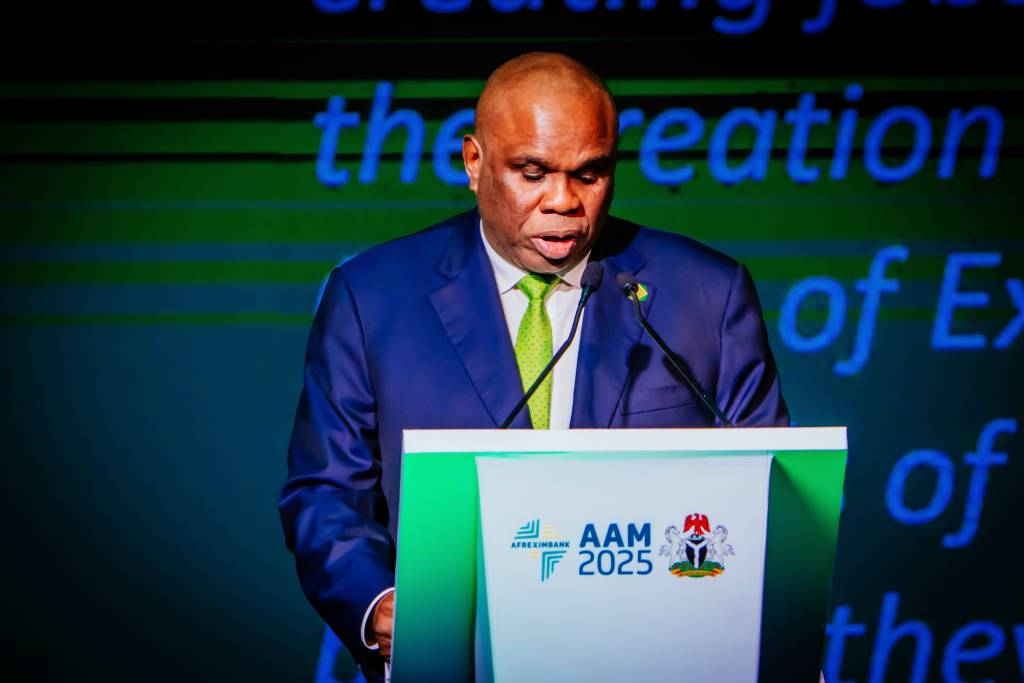
“We’ve Built a Resilient, Impactful Institution” – Oramah Says After Transformative Decade
In his AAM2025 opening address, Prof. Benedict Oramah, President and Chairman of the Board of Directors of Afreximbank, reflected on his transformative decade of leadership, underscoring the symbolic significance of returning to Abuja, the site of the Bank’s inaugural annual meeting in 1993, framing the moment as a full-circle milestone. His farewell remarks were both personal and inspiring, capturing the Bank’s journey and its pivotal role in reshaping Africa’s trade financing landscape.
“I gave the job the best of my energy, intellect, courage and determination. As a result, between 2020 and May 2025, Afreximbank invested approximately 120 billion US dollars in Africa and the Caribbean and 155 billion US dollars during the last decade. We have collectively, over the past decade, built a solid financial institution that is good for Global Africa. This achievement stands as a testament to our unwavering resolve and commitment,” he recalled.
Oramah highlighted the remarkable financial achievements attained during his tenure, emphasizing Afreximbank’s unprecedented growth and operational resilience. He pointed to the exponential rise in total assets and guarantees, as well as a significant surge in net income over a relatively short period. These milestones, he noted, were driven by sustained shareholder reinvestment, prudent financial stewardship, and innovative risk management strategies that have positioned the Bank as a cornerstone of Africa’s development financing architecture.
“Total assets and guarantees grew more than eightfold between September 2015 and April 2025, to reach 43.5 billion US dollars. Net income amounted to about 1 billion US dollars last year; a 700% increase from 125 million US dollars in 2015. Liquidity remained strong, with sources of funding much more diversified in 2024 than in 2015. Aggregate dividend payments from 2015 to 2024 reached 1.35 billion US dollars, with 50–70% reinvested annually,” he explained.
Prof. Oramah went on to recall how Afreximbank had acted decisively during successive crises, stepping in when traditional sources of support were absent. He underscored the Bank’s role as a critical lifeline, noting that when conventional financing dried up during the Covid‑19 pandemic and subsequent shocks, Afreximbank mobilised swift, large-scale relief to keep African economies afloat and supply chains moving.
“When vaccines arrived and there was no financing available, Afreximbank provided a 2 billion US dollar facility, which made it possible for Africa and CARICOM economies to procure 400 million doses of Johnson & Johnson COVID-19 vaccines. During the commodity shock of 2015–2016, we disbursed about 10 billion US dollars to support key economies. In the wake of the Ukraine crisis, Afreximbank disbursed 50 billion US dollars to help diversify sourcing and fast-track local projects,” he recounted.
Looking ahead, Prof. Oramah emphasized the urgent need for an “African best practice” grounded in indigenous solutions and greater local ownership of capital. He argued that conventional international models had often failed to serve Africa’s unique needs and realities, asserting that only bold, homegrown strategies—designed by and for Africans—could effectively chart the continent’s economic future.
“For us, the African best practice means that an institution like ours must understand the power of capital owned and controlled by Africans, and use it boldly, with courage and expertise, to support our people. It is because of this approach that we were able to support Dangote Refinery and Petrochemical Industry with over 4 billion US dollars. Such impactful interventions are the fruits of a uniquely African approach to development,” Oramah explained.
Prof. Oramah concluded by calling for steadfast support for Afreximbank’s incoming leadership, underscoring the importance of continuity in advancing the Bank’s mission of sustained collective commitment to building a resilient, self-reliant, and prosperous continent. “Our journey together has shown that when Africans own and control their capital, transformative change is inevitable. Continue to support and protect the Bank so that it can keep doing the heavy lifting that others cannot.”
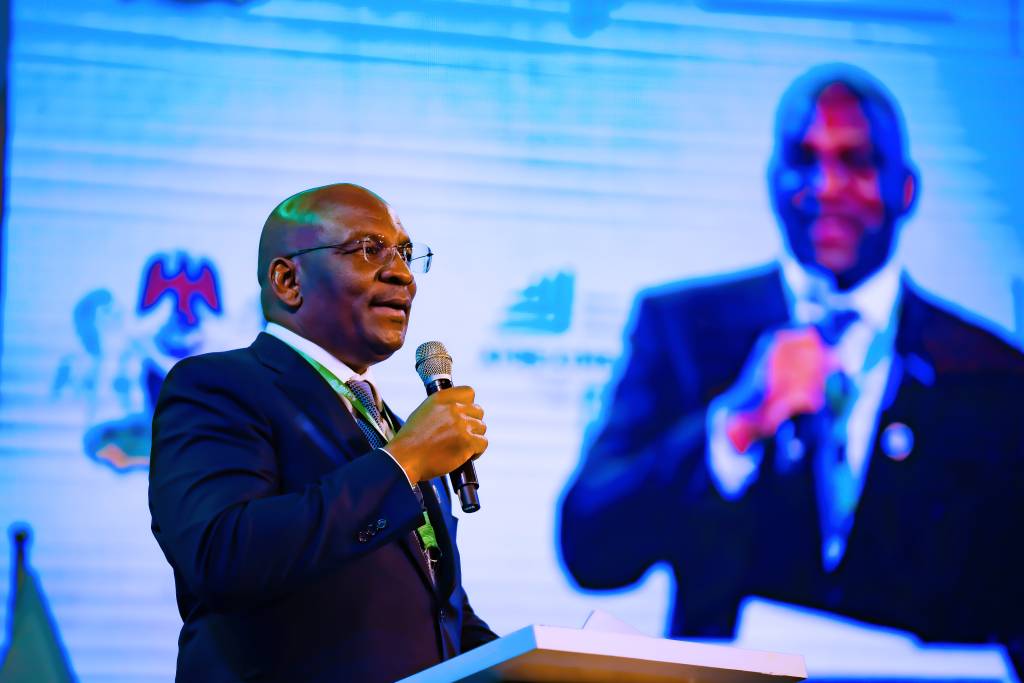
“Only Home-grown Institutions can Solve Africa’s Problems”. – Afreximbank SEVP
Mr. Denys Denya, Senior Executive Vice President of Afreximbank for Finance, Administration and Banking Services, described the Annual Meetings as a vital forum for shaping Africa’s policy agenda and fostering collaboration. “These Annual Meetings have become pivotal in generating ideas, shaping policy design, and changing the narrative, while at the same time creating a platform for forging constructive partnerships and strategic alliances.”
Denya recalled how Afreximbank emerged from a period of deep global economic crisis and Afro-pessimism, and in defiance of resistance, aimed at keeping Africa in dependency. “The establishment of the African Export-Import Bank was Africa’s response to the confluence of crises during the time, but was met with fierce resistance—both from internal and external forces—those whose goal it was to perpetuate the culture of dependence and underdevelopment of the continent.”
Denya, therefore, called on African nations to prioritise the strengthening of regional institutions such as Afreximbank, stressing that these bodies must be empowered to independently tackle the continent’s development challenges. He underscored the importance of strong political will, robust macroeconomic reforms, and intentional strategies to drive industrialisation as critical steps toward Africa’s self-sustained growth.
“In an era where funding is scarce for African entities, our home-grown institutions must be given all the support to solve our problems. We must focus on building strong, independent institutions, promoting good governance, and fostering regional cooperation. It is imperative to highlight that Institutional strengthening also requires strong political support, so as not to undermine their creation,” he said.
Mr. Denya urged Africa to draw strength from its history of resilience and progress, quoting Kwame Nkrumah’s famous remark: “Those who would judge us merely by the heights we have achieved would do well to remember the depths from which we started.” He affirmed that while Africa continues to face adversity in a shifting global economic landscape, it can face the future with confidence, knowing it has overcome immense challenges before.
“Resilience Not Accidental — Result of Deliberate Choices” – Nigeria’s Chief Banker
In his remarks at the 32nd Afreximbank Annual Meetings, Mr. Olayemi Cardoso, Governor of the Central Bank of Nigeria, congratulated the Bank on its 32 years of transformative impact, commending Prof. Benedict Oramah and the Afreximbank team for their visionary leadership, lauding the institution as a symbol of African agency and a pillar of financial leadership that has significantly shaped the continent’s economic trajectory.
“It is now a trusted partner, a convener of ambition, and a catalyst for change, shaping strategy, enabling execution, and promoting African agency globally. Let me begin by congratulating the Bank on its 32nd anniversary and commending President Benedict Oramah, the Board of Directors, and the entire Afreximbank team for their unwavering commitment to transforming the continent’s economic landscape,” he stated.
Like Denya, Cardoso also recalled the Bank’s establishment during a global financial withdrawal from Africa, noting Afreximbank’s prodigious growth from a modest capital base into a symbol of financial resilience. “From an initial capital base of 750 million US dollars; a relatively small sum by international standards, the Bank has expanded to over 40 billion US dollars in assets by the end of last year. This remarkable growth reflects prudent financial stewardship and the continent’s increasing confidence in its capabilities.”
The CBN Governor described Afreximbank as Africa’s reliable first responder during times of crisis—from COVID-19 to commodity shocks. “In response to the COVID-19 pandemic and through the Countercyclical Trade Liquidity Facility, Afreximbank has made significant contributions to Africa’s public health response and economic stability. These actions reinforce a profound truth: Africa’s resilience is inseparable from its capacity to propose and implement its own solutions.”
The Nigerian Central Banker concluded that building lasting institutions requires deliberate planning, strong governance, and long-term vision, calling for African institutions to anchor themselves in data, infrastructure, and humility, while staying responsive to crises. “Resilience is not accidental. It is the product of deliberate choices, strong foundations, and a mindset oriented towards the long term. It takes strategic foresight, crisis preparedness, robust systems and governance. Great ideas cannot succeed on weak foundations,” he concluded.
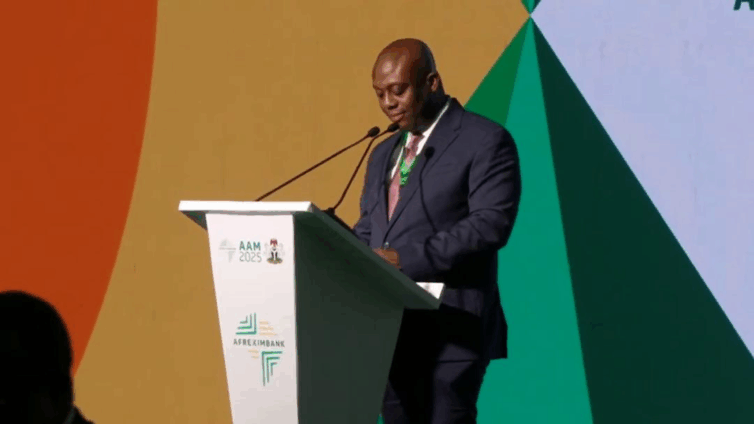
“Afreximbank Providing African Solutions to African Problems” – Ghana’s Finance Minister
Delivering remarks on behalf of Ghana’s Minister of Finance, Dr. Cassiel Ato Forson, Deputy Finance Minister Thomas Nyarko Ampem emphasized that Afreximbank’s impact goes far beyond trade financing. He praised the Bank’s bold interventions in trade facilitation, SME support, and industrialisation, citing initiatives such as PAPSS and its backing of regional value chains as powerful examples of African-led solutions to African challenges.
“Since its founding in 1993, the Bank has stood by African nations not merely as a financier but as a true development partner, helping to reimagine what is possible in African trade and transformation. The Global financial architecture does not always favour the developing world, yet institutions like Afreximbank continue to provide African solutions to African needs, tailored, timely, and transformative,” said Ghana’s Finance Minister.
Dr Forson emphasized the urgent need to match Africa’s well-documented resilience with innovation and coordinated action and described the African Continental Free Trade Area (AfCFTA) as a historic opportunity to transform the continent’s economic landscape. Still, he cautioned that structural challenges—ranging from climate change to inadequate infrastructure—require honest dialogue and bold, collaborative solutions.
“For decades, our continent has weathered storms of every kind – from economic shocks, health crises, climate disruptions, political uncertainties, to global market shifts. Yet, through all these, Africa has proven again and again that it is not only resilient but deeply resourceful. We have adapted, we have innovated, and we have found strength in unity. This resilience, deeply rooted in the spirit of our people, is the foundation on which we must now build the future,” he urged.
Dr. Forson stated that with the right policies and strategic investments—such as the AfCFTA—Africa has the potential to achieve unprecedented economic integration. He called for targeted interventions to address pressing challenges, including climate change, geopolitical tensions, youth unemployment, and the growing demand for infrastructure, stressing the need for urgent and collective action. “The resilience we celebrate today must now be matched with innovation, collaboration, and the relentless pursuit of solutions that are both inclusive and sustainable.”
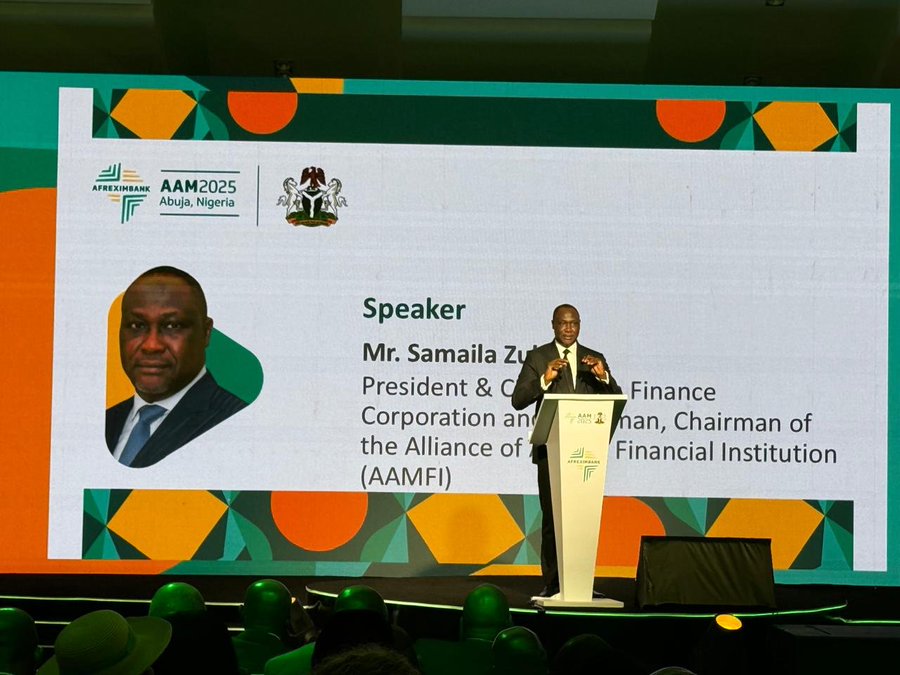
“Africa’s Development Must be Owned, Financed by Africans” – AFC President
Like previous speakers, Mr. Samaila Zubairu, President and CEO of Africa Finance Corporation (AFC) and Chair of the Alliance of African Multilateral Financial Institutions (AMFI), praised the transformative leadership of Prof. Benedict Oramah, crediting him with turning Afreximbank into a cornerstone of African self-reliance. He also underscored the strong partnership between Afreximbank and AFC in driving regional integration through strategic infrastructure investments—demonstrating the strength of African-led collaboration
“Under his stewardship, Afreximbank has become more than a bank; it has become a true pillar of African self-reliance and a first responder in moments when others hesitate. Together, we have implemented projects such as the Kano-Maradi rail line, strengthening regional integration, and activating the promise of the AfCFTA. We are now exploring ways to strengthen that partnership, particularly in Nigeria, where we are working on reviving the textile sector to create more jobs. We believe jobs are a core metric of economic success and the more jobs we can create, the brighter the future for the next generation,” he said.
More than other financial institutions, Zubairu said AMFI members are better positioned to deliver tangible results aligned with the continent’s priorities. “AMFI unites African-owned and African-controlled multilateral financial institutions built by Africans, for Africans. Together, our members manage a combined balance sheet exceeding 70 billion dollars. But the opportunities and responsibilities before us are even greater. Africa’s development must be owned and financed by Africans.”
The AMFI Chair highlighted that Africa possesses over $4 trillion in untapped domestic capital—including $1 trillion held in pension funds, insurance assets, and sovereign wealth funds—waiting to be mobilized at scale to drive infrastructure development, trade expansion, and industrialization. “As the world grows more fragmented and nations increasingly look inward, Africans must look within to look forward, find solutions to our development challenges. The era of dependence on external benevolence is giving way to one of self-determination.”
Mr. Zubairu said AMFI’s mission is deeply rooted in Africa’s sovereign aspirations for self-reliance, resilience, and long-term prosperity; hence, they are working with the African Union to activate the AU Development Fund to bridge funding gaps necessary to deliver the promises of Agenda 2063. He ended with a strong call to African governments and stakeholders to strengthen the continent’s financial institutions, safeguard their legal and regulatory frameworks, and empower them to mobilize and direct domestic capital toward Africa’s development.
“Oramah’s Relentless Drive Never Waned Til the Very End ” – Afreximbank’s Chief Economist
Delivering the vote of thanks at the close of the 32nd Afreximbank Annual Meetings in Abuja, Dr. Yemi Kale, Chief Economist and Managing Director of Research at Afreximbank, said in the course of AAM2025 delegates had reflected deeply on the resilience that has defined Afreximbank’s three-decade journey — from a bold idea on paper to an indispensable African institution driving integration, industrialization, and innovation across the continent.
“We have tackled some of the most pressing issues of our time — from restructuring Africa’s financial architecture, to reimagining trade and technology as levers of sovereignty, to building greater synergy with our brothers and sisters in the Caribbean. The insights shared, the strategies explored, and the partnerships renewed are testaments to the immense potential we carry when we act in unity and with purpose,” the Afreximbank Chief Economist said.
Dr Kale then paid a glowing tribute to the outgoing President, Prof. Benedict Oramah, whose tenure he said had been transformational. Under Oramah’s leadership, the Chief Economist said Afreximbank has moved beyond being a trade finance institution into becoming a true catalyst for Africa’s economic evolution, describing him as a visionary leader whose relentless drive never waned—even in his final months at the helm.
“Most people, nearing the end of such an illustrious tenure, tend to ease off — slowing down, taking stock, coasting toward the finish line. But not President Oramah. He did the opposite. He shifted into a higher gear. He worked harder. He launched more initiatives. He travelled more. He pushed boundaries with even greater urgency and he drove us in the bank even more aggressively— so much so that many of us at the Bank began to wonder if, perhaps, he wasn’t truly leaving after all,” he narrated.
Dr. Kale concludes with a statement: Prof. Oramah’s legacy would endure—not only through the institutions he helped build and the policies he shaped, but in the countless lives uplifted and businesses preserved across the continent. Speaking on behalf of Afreximbank, Nigeria, Africa, and the Caribbean, he extended heartfelt gratitude and called for a resounding ovation in honour of the man who, for over three decades, dedicated his life to transforming the fortunes of Global Africa.

